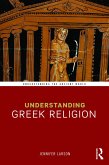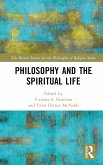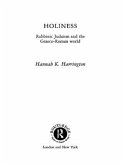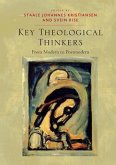Starting from the premise that religion is a human endeavour that can be analysed and compared across time and cultures, What Is Religion? brings the most up-to-date scholarship to bear on humankind's most enduring creation. Religious belief is one of the most pervasive and ubiquitous characteristics of human society. Religion has influenced human lives since prehistoric times, shaping the world views of cultures from isolated tribes to vast empires.
The book opens with a brief history of the idea of religion, then divides the study of religion into four essential topics - types, representations, practices and institutions - and concludes with a final, eye-opening chapter on religion today. Packed with case studies from a wide range of religions, past and present, What Is Religion? offers a very current, comprehensive, yet intellectually challenging, overview of the history, theories, practices and study of religion.
Thoroughly updated throughout, this second edition provides an accessible, wide-ranging, engaging and concise book for undergraduate students in the study of religion. It is also invaluable for students of anthropology, history, psychology, sociology and theology as well as anyone interested in how and why humans became and continue to be religious.
The book opens with a brief history of the idea of religion, then divides the study of religion into four essential topics - types, representations, practices and institutions - and concludes with a final, eye-opening chapter on religion today. Packed with case studies from a wide range of religions, past and present, What Is Religion? offers a very current, comprehensive, yet intellectually challenging, overview of the history, theories, practices and study of religion.
Thoroughly updated throughout, this second edition provides an accessible, wide-ranging, engaging and concise book for undergraduate students in the study of religion. It is also invaluable for students of anthropology, history, psychology, sociology and theology as well as anyone interested in how and why humans became and continue to be religious.
Praise for the first edition:
'This book is a mind changer. It firmly drops religion into the human sphere. At the centre of religions we may well find beliefs and practices related to gods and other superhuman agents. But the gods are products of the human imagination, hence a human phenomenon. Drawing on a wide range of historical theoretical traditions and using a broad range of examples of religious human doings, Jensen has written a learned, yet highly readable book that should go to the head of the "must read" line for all students of religion. He might just convince the reader that religion, though complex and important, is naturally explainable.' - Willi Braun, University of Alberta, Canada
'An unrivalled introduction to studying human beliefs and behaviours identified as religions, asking what kind of ideas or acts they are, how they arose and what relevance they have today.' - Graham Harvey, The Open University, UK
'A stimulating gateway to the study of religion that at the same time advances the field of religious studies as a secular endeavor. It does so by garnering and integrating rich interpretive resources from across the contemporary landscape of human sciences. An intellectual feast to which students are invited.' - William E. Paden, University of Vermont, USA
'An erudite introduction to religion that takes expert stock of important recent advances in the cognitive sciences. Highly recommended for students, professors, and anyone deeply interested in religion.' - Terry Rey, Temple University, USA
'Throughout the book, Jensen offers a wealth of interesting, varied, and poignant examples all of which serve very well to illustrate his theoretical points. He shows clearly that religion is a multidimensional phenomenon and treats it as such. The book has a critical approach to theories of the past, but it is at the same time refreshing how constructively Jensen treats these theories, describes how recent approaches are built on them, and shows their present relevance.' - Ingvild Sælid Gilhus, University of Bergen, Norway, in NUMEN
'Writing a book that discusses the complexities of religion within a span of 186 pages might seem an impossible task. Yet Jensen (Aarhus Univ.) is successful in doing so...[the] book is well-researched and well-written. Summing Up: Recommended.' - J. Jaeger, Dallas Baptist University, USA, in CHOICE
'If we accept an idea of teaching that is not to feed the students pre-packaged information and assignments but to make them use the knowledge actively gained, this volume is the ideal tool to sweep out the disciplinary room of the history of religions.' - Roberto Alciati, University of Turin, Italy, in Journal of Cognitive Historiography
'This book is a mind changer. It firmly drops religion into the human sphere. At the centre of religions we may well find beliefs and practices related to gods and other superhuman agents. But the gods are products of the human imagination, hence a human phenomenon. Drawing on a wide range of historical theoretical traditions and using a broad range of examples of religious human doings, Jensen has written a learned, yet highly readable book that should go to the head of the "must read" line for all students of religion. He might just convince the reader that religion, though complex and important, is naturally explainable.' - Willi Braun, University of Alberta, Canada
'An unrivalled introduction to studying human beliefs and behaviours identified as religions, asking what kind of ideas or acts they are, how they arose and what relevance they have today.' - Graham Harvey, The Open University, UK
'A stimulating gateway to the study of religion that at the same time advances the field of religious studies as a secular endeavor. It does so by garnering and integrating rich interpretive resources from across the contemporary landscape of human sciences. An intellectual feast to which students are invited.' - William E. Paden, University of Vermont, USA
'An erudite introduction to religion that takes expert stock of important recent advances in the cognitive sciences. Highly recommended for students, professors, and anyone deeply interested in religion.' - Terry Rey, Temple University, USA
'Throughout the book, Jensen offers a wealth of interesting, varied, and poignant examples all of which serve very well to illustrate his theoretical points. He shows clearly that religion is a multidimensional phenomenon and treats it as such. The book has a critical approach to theories of the past, but it is at the same time refreshing how constructively Jensen treats these theories, describes how recent approaches are built on them, and shows their present relevance.' - Ingvild Sælid Gilhus, University of Bergen, Norway, in NUMEN
'Writing a book that discusses the complexities of religion within a span of 186 pages might seem an impossible task. Yet Jensen (Aarhus Univ.) is successful in doing so...[the] book is well-researched and well-written. Summing Up: Recommended.' - J. Jaeger, Dallas Baptist University, USA, in CHOICE
'If we accept an idea of teaching that is not to feed the students pre-packaged information and assignments but to make them use the knowledge actively gained, this volume is the ideal tool to sweep out the disciplinary room of the history of religions.' - Roberto Alciati, University of Turin, Italy, in Journal of Cognitive Historiography









